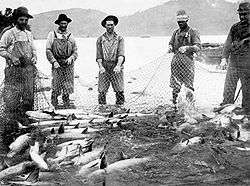漁師
Japanese

漁師 (ryōshi): salmon fishermen in Oregon, 1914.
| Kanji in this term | |
|---|---|
| 漁 | 師 |
| りょう Grade: 4 |
し Grade: 5 |
| on’yomi | |
Etymology
The spelling is likely from Middle Chinese compound 漁師 (ngjo srij, literally “fishing + master”). Compare modern Mandarin 漁師 (yúshī, “fisherman”).
The expected reading would be gyoshi. The kan'yōyomi (irregular but customary reading) of ryō for the 漁 character is from confusion with the 猟 character, usually read ryō in on'yomi contexts and meaning “hunt, hunting”, as used in the homophonic term 猟師 (ryōshi, “hunter”).[1]
Noun
漁師 (hiragana りょうし, rōmaji ryōshi, historical hiragana れふし)
- a fisherman, someone who fishes as a livelihood
Synonyms
References
- 1988, 国語大辞典(新装版) (Kokugo Dai Jiten, Revised Edition) (in Japanese), Tōkyō: Shogakukan
- 2006, 大辞林 (Daijirin), Third Edition (in Japanese), Tōkyō: Sanseidō, →ISBN
This article is issued from
Wiktionary.
The text is licensed under Creative
Commons - Attribution - Sharealike.
Additional terms may apply for the media files.